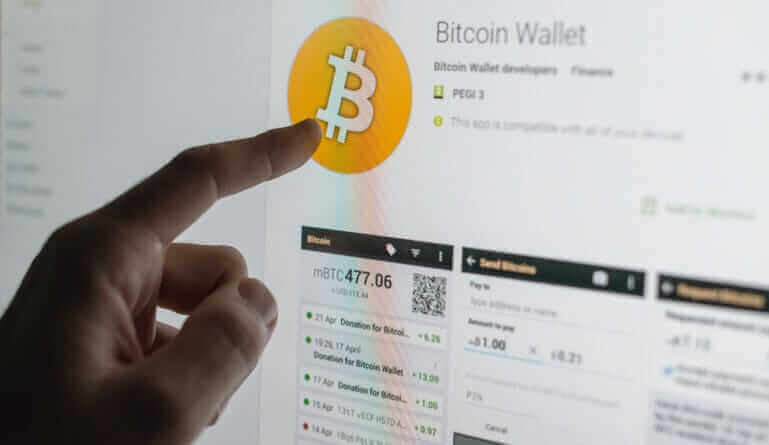Bitcoin, alternative to fiat money is digital currency that gives you full control, transparency and to your funds. Bitcoin wallet is a type of cryptocurrency program used to conjunction with the bitcoin network to send, receive and maintain transactions. Similar to Gmail or outlook is needed to send emails, you need a bitcoin wallet to send and receive bitcoins. Wallets monitor bitcoin addresses on the blockchain and update balances with each transaction
How Does Bitcoin Wallet Works?
Associated with your bitcoin account you have a private and public key. The bitcoin address is what you want to give to people to send and receive money. Similar to that of an email password, the private key individualizes the bitcoin as your own and is something you don’t want to share. Whoever knows the private key has control of the bitcoins. A wallet’s function is through the use of the private key.
Types of Bitcoin Wallets
Prior to sending a receiving bitcoin, you will need a place to store them. Choosing a wallet is the first step in receiving cryptocurrency. A quality wallet is essential in keeping your bitcoin safe.
There are different types of bitcoin wallets, wallets that cater to specific needs depending on security, convenience, the amount of bitcoin you keep, security, and what you want to spend. Here are the types of bitcoin wallets.
-
Web wallet
Web wallets enable bitcoin transactions through web browsers. Web wallets offer ease and convenience, being accessible to manage your bitcoin simply with an internet connection. Many web wallets require you to deposit funds into their online wallets in order to use the online wallet.
This type of wallet is least secure because you don’t have access to your private keys leaving you to rely on a third-party website to practice security measures. Its advised web wallets are only ideal in storing small amounts of funds.
-
Desktop/Software wallet
Wallets that are downloaded and installed on your computer are desktop wallets. They can only be accessed through that specific computer. Desktop wallets are easy and can be downloadable and store your private computer.
Although more secure than a web wallet, this type of wallet allows more chances for hackers to access your private keys and thus your funds because it’s a requirement a computer free of security weaknesses. Those using a desktop wallet should be wary of viruses, water damage to their computer.
-
Hardware wallet
Physical devices that store your private key and secure cryptocurrency. The fact that hardware devices cannot be hacked and when used on public machines or the internet makes them the securest form of wallet.
A downside may be that you always need to have your hardware device to make transactions meaning carrying it with you always. However, hardware wallets come with a price, although it may be worth it to users with a large number of funds.
-
Paper wallet
Paper wallets are just pieces of paper with the private key written on it or in QR code format Whoever has access to the paper is the only person who has access to the wallet. The downside of a paper wallet is that it can be easily destroyed or misplaced.
-
Brain wallet
It is a way to create a private key out of a chosen text or set of words. It gives the user to determine a passphrase making it more personalized to them. The downside to brain wallets is less secure and have a greater chance of being hacked as passwords are not randomized.
-
Mobile/ Electronic wallet
This type of wallet stores your private key on your mobile device through apps. Because of this they are highly convenient and are user friendly, you shouldn’t hold large sums of funds in mobile wallets.
Mobile apps offer lows privacy and are less secure because it allows access to your wallet through internet connections. But because phones can be lost, broken, or stolen, those with mobile wallets should back up their private key.
How to Get a Bitcoin Wallet
Receiving a bitcoin wallet simply depends on the type of wallet you choose to keep your bitcoin. Paper wallets can be generated using services like BitAddress or Bitcoinpaperwallet which allow users to create bitcoin addresses and private keys which can then be printed to be stored offline.
As for mobile wallets, there are many bitcoin wallet apps running on Android that makes daily basis trading possible such as Free wallet, Edge, Atomic Wallet, Lumi Wallet, Blockchain Wallet, Copay, Jaxx, and Mycelium.
Web wallets can be used on a device that’s connected to the internet on websites such as Coinbase, Lumi Wallet, circle, Blockchain, Strongcoin, and Xapo.
Desktop wallets are downloaded and installed on your computer: Electrum, Exodus, Atomic Wallet, Copay and Armory to name a dew. Hardware wallets, the most protected type of wallet through a device such as a Ledger Nano S, Trezor, or a KeepKey.
How to Create a Bitcoin Wallet
Before deciding on a wallet one must ask themselves the following set of questions to determine which wallet would best support their needs. Other questions should also be asked to determine which wallet to create but the questions below are the first step in helping you identify your needs.
- How often will I be using the wallet?
- Will I be storing large amounts of bitcoin or small amounts?
- How frequently will I use the wallet?
- How important is my privacy?
- Do I want to give a third-party power to safeguard my wallet?
How to Add Money to Bitcoin Wallet?
In order to add funds to your wallet, you have to purchase on an exchange and send them to your chosen wallet. Some of the most popular exchanges include:
- eToro
- coinbase
- Coinmama
Users should register with the above-listed exchanges and place an order for the desired amount. You can easily buy bitcoin with a credit or debit card or SEPA bank account. In order to send the purchased bitcoin to your account, you will have to enter your wallet address and the funds should be available to access in your wallet.
What are the Public and Private keys in Bitcoin Wallet?
Your bitcoin private key is a string of numbers and letters randomly selected that allows bitcoin to be spent. The private key is very important in that whoever has access or knows your private key has control of your bitcoin.
If your private key is lost or hacked, you can no longer access your bitcoin. The public key is public and can be given out to whoever you want to receive cryptocurrency from.
What is Backup Key?
A backup key is a file containing your wallets private key that can be exported or important to your wallet. in the event that the device where your wallet is installed is damaged, lost, stolen, or what have you, your backup key is there to restore and prevent the loss of bitcoins.
The backup key is seen as extra protection a type of insurance to your bitcoin it is advised that users’ backup their information to prevention.
What is a Hot Wallet and Cold Wallet?
Cold wallets are those that completely offline and come in the form of paper or hardware wallets. They are more formal and safest compared to hot wallets. Hot wallets which are wallets that are online. Hot wallets are those that need to be connected to the internet such as web, desktop, and mobile wallets.
How to Secure your Bitcoin Wallet
-
Choose hardware wallets
Of all the wallets listed and discussed, hardware wallets are the safest and secure in keeping your bitcoin and storing key information. hardware wallets use two-factor authentication for security and are the best option for keeping a large number of funds.
-
Keep your private key offline
Utilizing cold storage options is best for securing your savings. It takes away the risk of hacking and other vulnerabilities the online wallets bring.
-
Always use the secure internet connection
However, if you do decide to utilize cold storage you should be sure to use secure internet connection. Connecting to public networks will make your wallet susceptible to frauds, thieves, and hackers. It’s best to use your own home WIFI or a personal hotspot in public areas to avoid security concerns.
-
Use up-to-date antivirus software
Keeping your bitcoin system up-to-date will help you maintain prevention and fix security issues quickly. In order to keep your wallet safe, you should always be updating your mobile and computer devices checking for updates and fixes that can protect you from malware or trojans.
-
Do not access unknown links
Hackers often get creative when trying to get ahold of your account. Be wary of clone URL sites and scam emails asking you to verify your account by entering your information.
-
Use a strong password for your online wallet
It is advised that the password is completely randomized and free of any familiarity. Avoid including personal information such as birthdays, favorite colors, etc. you should never forget your password doing so will result in the loss of the entirety of your funds in that wallet.
-
Never give away your private key
It is known that whoever knows or has access to your private key has access to your bitcoin and is free to manage funds whoever they desire. You should never tell anyone your private for your own safety.
-
Keep a separate wallet for day to day transactions
Separate your everyday funds form your savings funds. You wouldn’t want to jeopardize losing large amounts when you only need a small amount daily. The number of wallets is endless so there is nothing stopping you from dedicating specific wallets for specific purposes.
-
Use two-factor authentication for online wallets
You should utilize multi-signature to protect against theft. Two-factor authentication is just one security measure you should exercise that allows you to double authorize transactions in case of fraud or accident.
-
Always check the bitcoin address
When sending bitcoin, you should make sure to double-check the recipient’s address. Systems can be hacked into sending the funds to a different account.
-
Back up your digital wallet
Backup allows you to restore your wallet in case its system crashed, lost, or stolen. You should keep a backup or multiple and store it in a secure place that only you know about
-
Small amounts for everyday use
Similar to cash, you wouldn’t walk around with large amounts of cash for everyday use for risk of loss or theft. In that same way, wallets that are used for everyday use should only hold a small amount.
Disadvantages of Bitcoin Wallet
Bitcoin is a wide method of paying and for goods and services indeed has its own set of pros and cons. Here are a few obstacles facing bitcoin.
-
Potential of theft
As we’ve discussed stressed the need for security in bitcoin wallets and its importance, it’s clearly identified that the potential for theft is one of the many challenges. Cryptocurrency is the target of hackers all over the world. Although there is a multitude of security measures that can be taken to prevent this, there always chances funds can be stolen.
-
Acceptance by the masses
Created in 2009, bitcoin became a hot topic trend and adopted by some in 2017 but still hasn’t been accepted by the masses as a regular form of currency today. The acceptance by the masses is probably due to the challenge of bitcoin being user friendly enough to be grasped by the masses. There are many online retailers that accept bitcoin but it’s still a while before we will be paying restaurants and grocery stores with bitcoin.
-
Tax issues
To avoid getting in trouble with the IRS the use of bitcoin will have to come with an amount of record-keeping for every bitcoin purchase and transaction.
Which Wallet is Best for You?
With all the different types of wallets, it can be confusing to decide which wallet is best for you. You should evaluate your needs to decide how to cater to them to a specific wallet. Different people will use different Bitcoin wallets for different purposes.
For example, if you a seasoned bitcoin user and security is your main concern it would be wise to utilize a hardware wallet that offers the best security. However, if you are a beginner just starting out with bitcoin wallets it may be more ideal to utilize a more user-friendly wallet such a desktop or mobile wallet.
Bitcoin users’ needs range from anonymity, convenience, easy use, price, or popularity and there are different types of wallets that can be catered to each user’s needs.
How much do Bitcoin Wallets Cost?
If you are serious about cryptocurrency and want to make sure your funds are secure you may want to invest in a hardware wallet, hardware wallets range anywhere from $50-$100 but are well worth the money in the long run.
Most web, desktop, and mobile wallets are free and offer reliability and convenience.
Difference Between a Bitcoin Exchange and Bitcoin Wallet Website
As discussed, a bitcoin wallet is where you store your bitcoin. A bitcoin exchange is where you can convert fiat currency to bitcoin digital currency and vice versa. Exchanges are used also when you want to add funds to your bitcoin wallet.
In contrast to a bitcoin wallet where you have the private keys, in bitcoin exchange, you would be storing your private keys in the website’s wallet and only having access to it. But unlike the concerns that come with having a bitcoin wallet such as backing up or security, a bitcoin exchange is a web-based wallet allowing you not to worry about security concerns, allowing for more convenience.
Final Thoughts
Bitcoin used and distributed electronically has become one popular form of digital currency because of its privacy, transparency, and ease of use. A bitcoin wallet is the first step in keeping your bitcoin safe. Wallets range on the scale from security to convenience and it’s up to users to decide where on the scale they want their wallet to fall.







